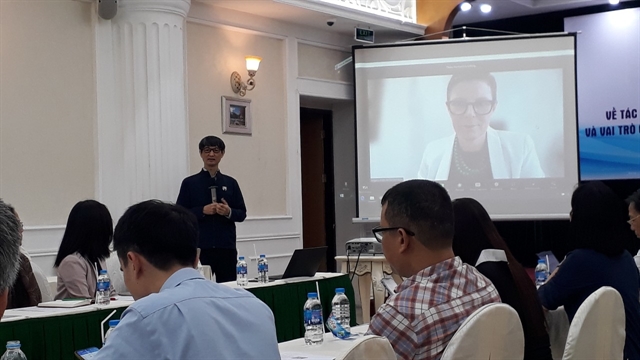 Society
Society

 |
| Participants at Friday's press conference on the health impacts of sugary drinks and the role of taxation policies in controlling consumption. — VNS Photo Minh Hằng |
HÀ NỘI — Taxation policies are hailed as effective measures in curbing the consumption and harmful effects of sugary drinks.
It was heard at a media briefing on the health effects of sugary drinks and the role of taxation policies in controlling consumption, organised by the Ministry of Information and Communications on Friday in Hà Nội.
Dr. Angela Pratt, World Health Organization (WHO) Representative in Việt Nam, emphasised the imperativeness of initiating measures to reduce the consumption of sugary drinks in order to achieve a healthier and safer society.
Global evidence shows that consuming sugary drinks increases the risk of type 2 diabetes and tooth decay, while also contributing to overweight and obesity rates.
WHO recommends limiting the consumption of free sugars – any sugars added to food or drinks – to below 10 per cent of total energy intake, ideally below 5 per cent, equivalent to around 25 grams per day for an average adult.
The WHO representative also informed that in Việt Nam over the past 10 years, people have been consuming more sugary drinks, averaging one litre per week.
Overweight and obesity rates are increasing rapidly, especially among young people.
In cities, for every four adolescents aged 15-19, there is more than one person who is overweight or obese.
Globally, a common measure to reduce the harms from sugary drinks is to increase prices through taxation.
Evidence and current experience show that if taxes increase the price of beverages by 10 per cent, people will drink about 11 per cent less. They switch to healthier options like bottled water.
In addition to taxation, the WHO also recommends implementing measures such as: front-of-pack nutrition labelling on beverages, restricting advertising, limiting sugary drinks in schools, and providing education on healthy nutrition for children and adolescents.
Emphasising the role of taxation policies in human health, Deputy Head of the Legal Affairs Department under the Ministry of Information and Communications Hồ Hồng Hải stated that in early 2022, Prime Minister Phạm Minh Chính approved the National Plan for Non-Communicable Disease Prevention and Mental Health Disorder Management for the 2022-25 period.
It emphasises the need to enhance health communication and reduce behaviours that increase the risk of non-communicable diseases. The plan highlights the role of taxation policies in controlling sugary drinks.
The improper use of these products is the main cause of overweight and obesity, metabolic disorders, increased risk of diabetes, hypertension and cardiovascular complications.
At the seminar, healthcare experts unanimously affirmed that taxation policies play a crucial role in safeguarding human health.
Nguyễn Tuấn Lâm, an expert from the World Health Organization (WHO), recommended that Việt Nam consider implementing a 20 per cent tax on sugary drinks, calculated based on retail prices, in line with WHO guidelines.
This measure aims to mitigate health risks for upcoming generations.
He further suggested considering taxation based on sugar content or threshold, incentivising products with lower sugar content and fostering an environment conducive to reducing sugary drink consumption.
Expressing hope for Việt Nam to soon limit the consumption of unhealthy foods and sugary drinks, Associate Professor Dr. Trương Tuyết Mai, deputy director of the National Institute of Nutrition, advocated measures beyond just implementing special consumption tax policies.
She emphasises the crucial need for regulations requiring front-of-pack nutrition labelling on packaged products and curbing advertisements promoting unhealthy foods, particularly those aimed at children.
She called for the development of technical standards for school meals, along with regulations promoting proper nutrition and physical activity within school premises.
Additionally, she proposed stringent guidelines for school canteen operations, ensuring the provision of nourishing and healthful food and beverages to students. — VNS